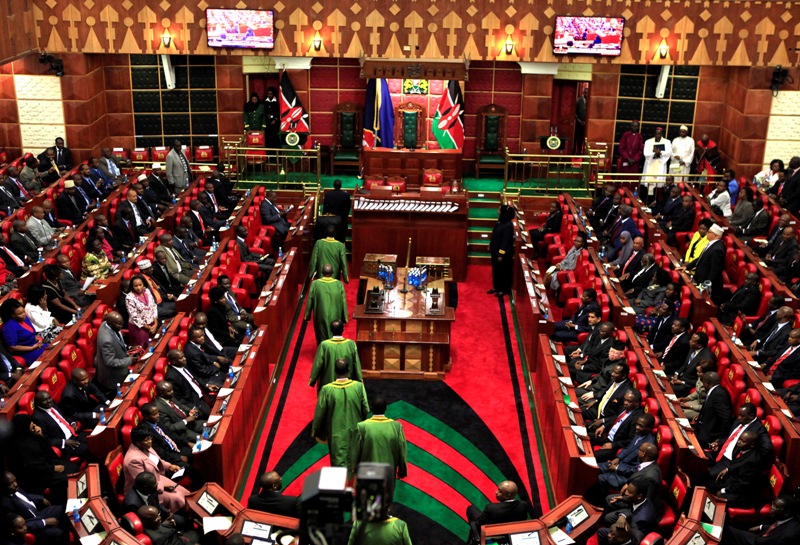Opposition MPs proposed several amendments to the Finance Bill 2023 seeking to scrap the 16 per cent Value Added Tax (VAT) on Petroleum, Housing Levy, excise duty on human hair, wigs and artificial nails as well as imported fish.
Out of the 12 amendments to the Finance Bill, 2023, the opposition Azimio La Umoja Coalition filed eight amendments while two MPs from the ruling Kenya Kwanza Alliance sponsored two.
The chairpersons of the committee on Delegated Legislation and the committee on Blue Economy, Water and Irrigation sponsored one each.
The opposition MPs sponsored multiple amendments to clauses 2, 24, 33,36, 43, 76 and 78 of the Bill. Clause 2 seeks to amend the Income Tax Act on the definition of winnings and digital content monetization.
Azimio lost its first bid to amend the Bill after Seme MP James Nyikal (ODM) failed in his bid to amend Clause 2 on taxation of content creators after Kenya Kwanza MP overturned the proposal by 189 votes against 87 in a physical vote.
Saboti MP Caleb Amisi has also sponsored amendments to impose five percent tax in respect of payment relating to digital content monetization on the first Sh288,000, ten per cent on the next Sh2.7 million and 15 per cent above Sh6 million.

The amendments to Clause 24 seek to introduce new tax bands on income of those earning Sh500,000 and above at 35 percent tax.
Mr Amisi has also proposed to amend individual tax rates at 10 per cent on the first Sh288,000 and 10 percent above 288,000.
Mathare MP Antony Olouch wants individual tax rate to be fixed at 10 per cent on the first Sh288,000, 25 percent on the next Sh100,000, 30 per cent on the next Sh212,000 and 30.5 per cent above Sh6 million.
Homa Bay Town MP Peter Kaluma wants Clause 24 amendment to set individual tax rate at 30 per cent on the next 5,612,000 and 35 per cent on all income over Sh12 million.
The Finance Committee has proposed that for the first Sh288,000 income, a rate of 10 per cent, on the next Sh100,000 (25 per cent), on the next Sh5,612,000 (30 per cent), on the next Sh3,600,000 (32.5 per cent) and on all income over Sh9 million incurs 35 percent tax.
Several MPs proposed amendments to Section 33 on the Treasury proposal to impose a 20 per cent excise duty on imported fish.
Blue Economy, Water and Irrigation chairperson Kangogo Bowen wanted the 20 per cent excise duty on imported fish excluding fish and fish products from the East Africa Partner States to meet EAC rules of origin and Comesa.
Alego Usonga MP Samuel Atandi wanted to delete the 20 per cent duty on imported fish while his Nyando counterpart Jared Okelo proposed a reduction of excise duty to five percent.
The proposal under Clause 36 requiring individuals with tax disputes to deposit 20 percent of the tax before launching an appeal also attracted a number of amendments.
“That Clause 36 be deleted,” Mr Kaluma said in an amendment.
The changes to Clause 43 touched on excise duty on imported chocolates, powdered juice, sugar, wigs, false beards, eyebrows and eyelashes, imported furniture, imported cellphones, paints and furnishes advertisement on television and print among others.
Kathiani MP Robert Mbui has proposed deletion of five per cent excise duty on human hair, wigs, false beards and other products,
But Kenya Kwanza’s Didmus Barasa (Kimilili) has proposed to impose 10 per cent excise duty on human air, wigs, false beards and artificial nails.
Mr Amisi, Mr Olouch, Mr Kaluma, Mr Mbui, Makali Mulu (Kitui Central, Wiper) and Caleb Mule (Machakos Town Wiper) proposed the deletion of the Clause 76 that establishes the controversial Housing Levy from the Finance Bill, 2023.
“That Clause 76 of the Bill be deleted,” the amendments to the Housing Levy states.
Kabuchai MP Majimbo Kalasinga proposed to amend the Housing Levy to make it a voluntary contribution.
He also proposed that on expiry of seven years or attaining retirement, an employee be entitled to transfer their contributions to a retirement benefits scheme, transfer to their spouse or children or receive the money in cash at the prevailing interest rate.
MPs wanted to amend clause 78 to block the Treasury from extending the live of over 2000 statutory instruments that have expired or due to expire by December 31, 2023.
The Statutory Instruments Act 2013 stipulates that all subsidiary legislations or regulations shall expire after 10 years of taking effect.
Mbeere North MP Goefrey Ruko wanted to introduce a new clause 71A to the First Schedule to the Miscellaneous Fees and Levies Act, 2016 to delete the description “iron ores and concentrates, including roasted iron pyrites” and the corresponding tariff number and export levy.
National Assembly Speaker Moses Wetang’ula allowed MPs who filed amendments to prosecute their proposed changes to the Bill during the Committee of the Whole House.
This is a departure from the past practice where amendments that touch on Money Bills cannot be allowed without the House taking into account the views of the Cabinet Secretary responsible for finance in line with Article 114 of the Constution.



